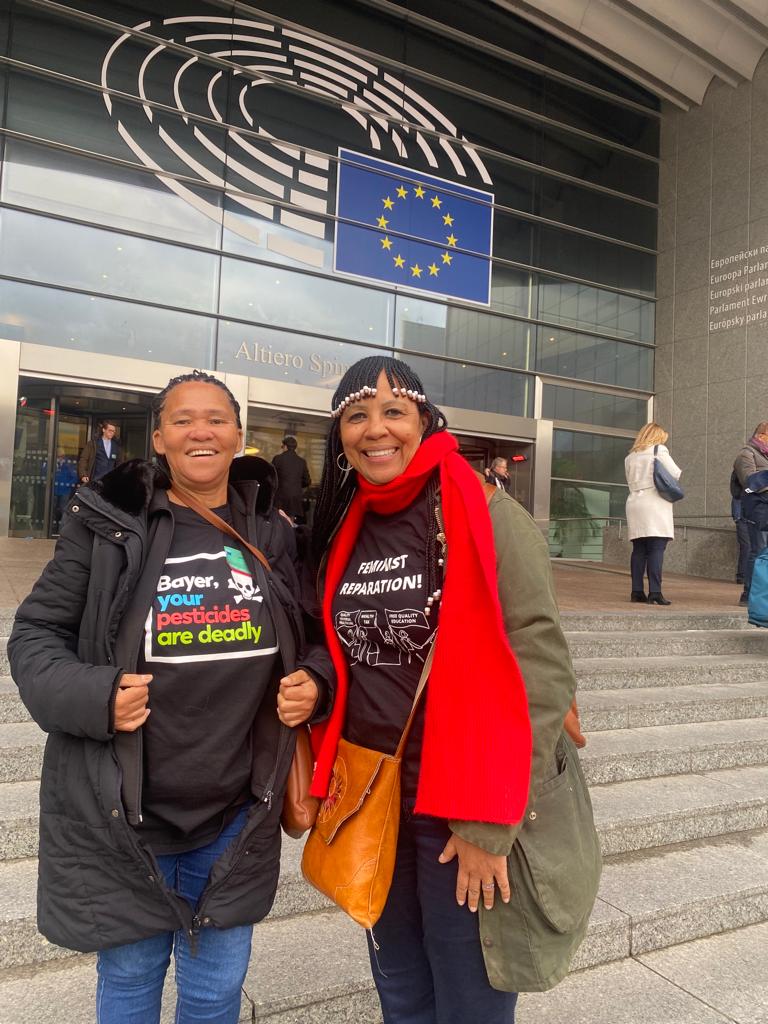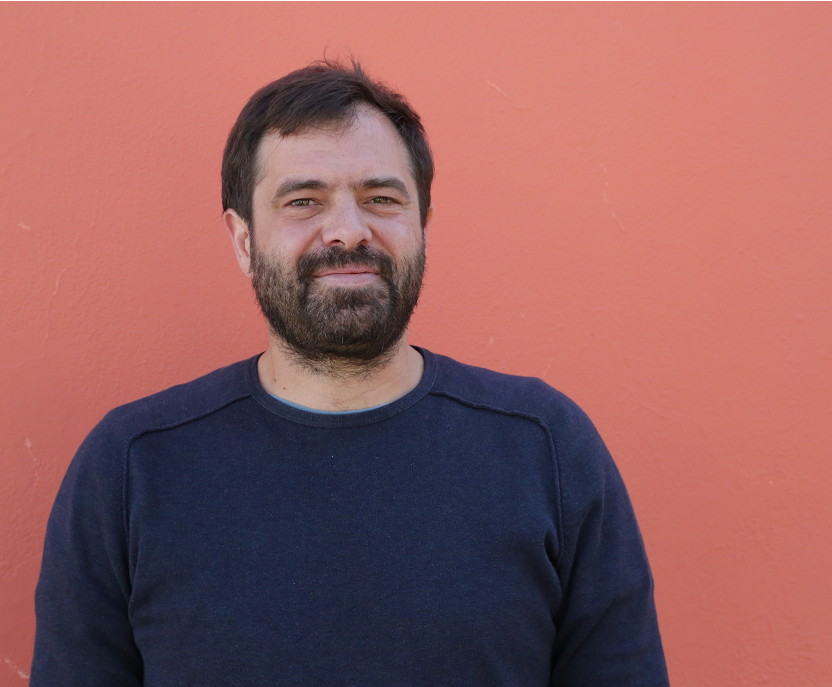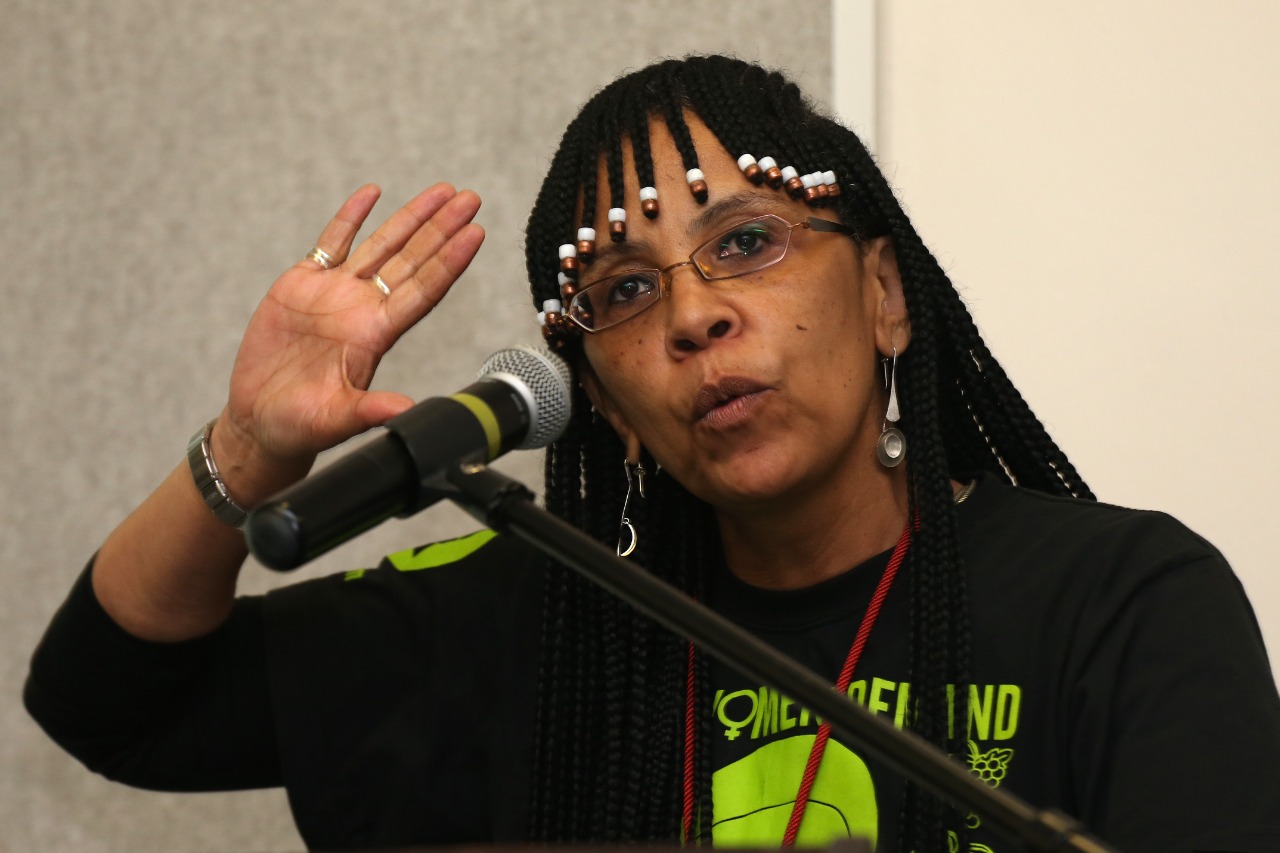An insightful interview with Colette Solomon from South Africa's Women on Farms Project (WFP), delving into the urgent battle against highly hazardous pesticides. She sheds light on the devastating impacts these agrotoxins have on farm workers and women, explores the steps needed to eliminate their use, and shares her vision for the documentary feature film “Toxic Harvest”.
Colette Solomon is the Director of Women on Farms Project, a non-profit organisation assisting and fostering the agency of women farm workers and farm dwellers in the Western Cape and Northern Cape in South Africa. Women on Farms Project is one of the co-publishers of “Toxic Harvest”. Interview by Jan Urhahn, Food Sovereignty Programme, Rosa-Luxemburg-Stiftung Southern Africa.

- Why is the fight against highly hazardous pesticides so crucial, and what exactly are these chemicals?
The fight against highly hazardous pesticides (HHPs) is critical and urgent because exposure to these chemicals has acute and long-term health impacts on people, especially on farm workers and dwellers, not to mention the harmful impacts on the environment. These agrochemicals are widely used on commercial wine, table grape and fruit farms in South Africa. Many of these agrochemicals have long been banned in the European Union (EU) because they are dangerous to human health. We are most concerned about highly hazardous and extremely hazardous pesticides, classified as categories 1a and 1b by the World Health Organization (WHO). These substances are lethal even in small doses.
- How do the pesticides used in agriculture impact farm workers and those living on farms in South Africa?
It is important to understand the broader context of agricultural work in South Africa: farm workers' labour rights are routinely violated in various ways, despite the existence of relatively strong labour laws. There is a prevailing sense of impunity among commercial farmers, coupled with weak enforcement by inspectors from the South African Department of Employment and Labour. Additionally, farm workers face low rates of unionization, and the growing precarity and insecurity of agricultural labour only exacerbate the situation. Farm workers, especially women seasonal and migrant labourers, face severe exposure to pesticides due to unsafe working and living conditions. Lacking basic protections like personal protective equipment (PPE), they are often forced to work in fields shortly after spraying and without access to soap or water to wash off pesticide residues. This means they eat with pesticide-contaminated hands and take home tainted clothing, exposing their families – including children – to harmful chemicals. Living near vineyards amplifies the danger, as pesticide drift contaminates homes. After spraying pesticides drift into homes through open windows and doors, settling on furniture and surfaces where families eat, sleep, and live. Even clothes drying on outdoor washing lines become contaminated, turning everyday activities into sources of toxic exposure. Aerial spraying extends the reach of toxic chemicals, affecting entire communities. Workers and their families endure health issues like skin burns, nausea, respiratory problems, and potentially cancer, yet receive no compensation for these often lifelong impacts.
- What does pesticide regulation currently look like in South Africa and the wider region, and are there gaps that need urgent attention?
In South Africa, the regulation of agrochemicals is outdated, governed by a law dating back to 1947. This means the law does not reflect modern scientific research or international best practices. In 2022, the South African Department of Agriculture's Registrar of Pesticides announced plans to ban certain HHPs by June 1, 2024. While some agrochemicals were eventually banned, these were not the most dangerous ones, and many from the most hazardous categories, such as WHO Class 1a and 1b, remain in use. In 2024, the Department of Employment and Labour released Draft Regulations for Hazardous Chemical Agents. However, these regulations present significant issues, farm workers and dwellers were not adequately consulted, and the regulations permit derogations – allowing companies to apply for exemptions to continue using certain agrochemicals. These gaps highlight the need for stronger, more inclusive regulations to protect vulnerable communities.
- Can you unpack the concept of “double standards” in the global pesticide trade and explain why they pose such significant challenges?
Many pesticides active ingredients have been banned in the EU for many years due to their harmful impacts on human health and the environment. Double standards refer to the practice whereby such agrochemicals are still manufactured in the EU and exported to countries in the Global South, like South Africa, despite being banned in their countries of origin. For example, the German agrochemical giant Bayer sells more than 50 products to South Africa, although they are banned in Germany and the EU. We contend that if they are harmful to Europeans, they are just as harmful to South Africans. These double standards pose significant challenges because of the power and influence of these companies which simply continue to export and profit from the export and sales in countries in the Global South, where pesticide regulation and enforcement are generally weaker.
- What steps can we take to eliminate double standards in the pesticide trade once and for all?
Immediate action is needed to address the global harm caused by HHPs. Companies must stop the production and export of pesticides that are banned in their country of origin. Exporting nations, such as EU member states like Germany, should enforce a complete ban on the production, handling, storage, and export of HHPs already prohibited. The goal must be that such a policy must become an EU regulation and apply for all EU member states.
Countries in the Global South should follow suit by banning pesticides that are already banned in their countries of origin. All pesticides classified as WHO Class 1a and 1b must be immediately banned worldwide. HHPs must be phased out, leading to a global ban on their production, storage, trade, and export, including their active ingredients. These harmful chemicals must be replaced with safer alternatives, such as biopesticides. To achieve this, binding international legislation is essential to close loopholes and prevent companies or countries from circumventing regulations. Ultimately, the reliance on industrial, large-scale, intensive agriculture must be replaced by agroecological practices, which eliminate the need for dangerous chemicals while promoting sustainable and healthy farming systems.
- Farm workers are leading the fight against agrotoxins. Can you share the history of their resistance to these chemicals and how this struggle has evolved over time?
In 2019, farm workers embarked on a campaign against double standards in the international pesticides trade. This followed research commissioned by the Women on Farms Project (WFP) on the labour conditions of women farm workers in the Western Cape and Northern Cape of South Africa. The research found that these workers are routinely exposed to pesticides while working. Additionally, WFP's research identified 67 pesticide active ingredients that are produced and banned in the EU but are still legally exported to South Africa. Initially, women farm workers called on the South African government to ban pesticides that are already prohibited in the EU. Over time, the campaign expanded to target pesticide-producing companies like Bayer, demanding they halt the production and export of pesticides banned in their countries of origin. As part of this effort, a Memorandum of Demands was delivered to Bayer's office in the Western Cape. The campaign then broadened to include seven other Southern African Development Community (SADC) countries —Eswatini, Namibia, Mauritius, Mozambique, Tanzania, Zambia, and Zimbabwe – where WFP has been working with farm worker trade unions to raise awareness among their members.
The campaign further evolved to engage with Global North stakeholders, including civil society organisations advocating for a global ban, as well as members of the European Parliament and government officials in Germany and Belgium. In collaboration with Oxfam, WFP also presented a Memorandum of Demands to the German Consul General in South Africa for submission to the German Chancellor. In 2025, WFP, together with an alliance of civil society organisations and trade unions, organised and hosted a People's Tribunal on Agrochemicals to bring the issue into the spotlight.
- What are your hopes for the impact of the documentary feature film “Toxic Harvest”? What change do you envision it inspiring?
I hope that the documentary “Toxic Harvest” will raise awareness and strengthen solidarity among “ordinary” citizens of the harmful impacts of these pesticides – on the health and wellbeing of farm workers and dwellers, the environment and even as residues on the fruit which we all eat. I hope that this awareness will galvanise people to support a global ban of HHPs by lobbying their respective countries and governments. We saw how global solidarity contributed to the struggle against apartheid; we believe that global solidarity (among workers, consumers, etc.) can also bring about a global ban of HHPs.
Latest posts




